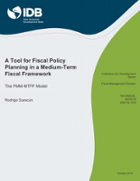A Tool for Fiscal Policy Planning in a Medium-Term Fiscal Framework: The FMM-MTFF Model
Date
Oct 2018
This paper describes the FMM-MTFF model, a dynamic stochastic general equilibrium model developed by the Fiscal Management Division (FMM) of the Inter-American Development Bank (IDB) to support the implementation of a medium-term fiscal framework (MTFF) in emerging market and developing economies. Relative to existing models, the present model incorporates several non-standard features. First, fiscal policy is defined in terms of multi-year fiscal plans, instead of restricting attention to univariate, single-period fiscal shocks. Second, the model does not impose the straightjacket of a standard fiscal rule. Under a standard fiscal feedback rule, fiscal policy is countercyclical and sustainable by design and any fiscal challenge is mechanically addressed. Third, the model is calibrated to match a three-sector, stylized version of a country’s input-output (I-O) table, which provides a consistent framework on industry output, intermediate input flows, and final demand use data. Fourth, the model embeds a more realistic GDP measurement framework, one that is consistent with what national account compilers do. The model uses a chain-linking method to aggregate real GDP. The model is calibrated to Colombian and Peruvian data to illustrate the use of the model as a tool to quantify the scale of the fiscal challenges, provide consistent medium-term macro fiscal projections, and assess the quantitative implications of past reforms and alternative fiscal policy plans on the economies, that is, the typical questions of interest to an MTFF.




